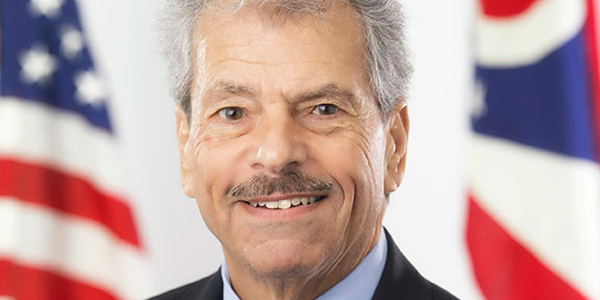Public Utilities Commission of Ohio Chair Sam Randazzo resigned Friday, less than a week after the FBI raided his home in Columbus.
Randazzo, who has served as the chair of the PUCO since he was appointed by Gov. Mike DeWine (R) in 2019, made the announcement in a letter sent to the governor.
The move came one day after FirstEnergy told the U.S. Securities and Exchange Commission that it made a $4 million payment to an “entity associated with an individual who subsequently was appointed to a full-time role as an Ohio government official directly involved in regulating” companies regarding “distribution rates.” FirstEnergy said the payment led to the firing of three of its executives, including former CEO Charles Jones. (See Chief Ethics, Legal Officers ‘Separate’ from FirstEnergy.)
“At this time, it has not been determined if the payments were for the purposes represented within the consulting agreement,” FirstEnergy said. The executives who were terminated “did not reasonably ensure that relevant information was communicated within our organization and not withheld from our independent directors, our Audit Committee and our independent auditor.”
Parting Words
In his letter, Randazzo mentioned both the FBI raid and the SEC filing as reasons for his resignation, saying the incidents could “fuel suspicions about and controversy over decisions I may render in my current capacity.”
“The events and news of this week have undoubtedly been disturbing or worse to many stakeholders who rightfully look to the Public Utilities Commission of Ohio, the Ohio Power Siting Board and me as the chair to act in the public interest within the statutory legal framework,” Randazzo told DeWine. “In present times, when you, good sir, are valiantly battling to save Ohioans from the surging attack of COVID-19, there is no room or time for me to be a distraction.”
DeWine, who appointed Randazzo in February 2019, announced the resignation during a Friday morning press conference. The governor confirmed reiterated that Randazzo said he felt he would be a distraction.
“I want to thank him for his work,” DeWine said. “He has done very, very good work as chair.”
At a Tuesday morning press conference about the state’s COVID-19 response, reporters asked DeWine whether Randazzo was the target of a federal investigation into an alleged scheme by FirstEnergy to bribe state officials, including former House Speaker Larry Householder (R).
“I have no reason to think he is a target,” DeWine had said. “We’re waiting for additional information, quite candidly.”
Before joining PUCO, Randazzo was a partner at McNees, Wallace & Nurick and represented Industrial Energy Users-Ohio. According to an ethics statement, Randazzo has an ownership in two consulting businesses, including Sustainability Funding Alliance of Ohio, that did work for FirstEnergy Solutions (FES), FirstEnergy’s former generation subsidiary. FES emerged from bankruptcy this year as an independent company, Energy Harbor.
Earlier this month, PUCO began an audit of FirstEnergy to see whether the company broke any laws or regulations regarding its interactions with FES.
In July, federal prosecutors alleged FirstEnergy spent $61 million in bribes, “dark money” campaign contributions and advertising to elect Householder and his allies in return for their support of House Bill 6, which provided $1.5 billion in subsidies for the utility’s struggling nuclear plants. (See Feds: FE Paid $61 Million in Bribes to Win Nuke Subsidy.)
In his letter, Randazzo defended his tenure on the commission, saying that before he joined, its decisions were “better characterized as being the product of a rubber stamp than reasoned analysis and proper application of the law. Local interests were unnecessarily subordinated to the virtue-signaling demands of wind and solar farm developers, some of which were only interested in flipping their project.”
He also argued that PUCO had “taken on the runaway electric transmission service rate increases by proactive intervention and advocacy at the Federal Energy Regulatory Commission, a federal agency that has exclusive jurisdiction in this area and seems eager to give transmission utilities money for nothing.
“Prior to my arrival, this important work was not getting much if any attention, and the customer impacts of federal decisions on the price and availability of energy in Ohio were not getting their deserved attention,” he said.
Also contained in the letter was parting advice for DeWine and his former colleagues.
“The worst out-of-market compensation abuses of the Strickland administration’s electric security plan (ESP) statute, all of which were imposed on customers well prior to my arrival, have been mitigated or cut short where possible,” he wrote. “The next step is, in my view, elimination of the ESP statute itself and focusing on the use of a proper competitive bidding process to set the generation supply price for retail electric customers not served by a competitive supplier.”
He also called on the state legislature to rescind HB 6.





